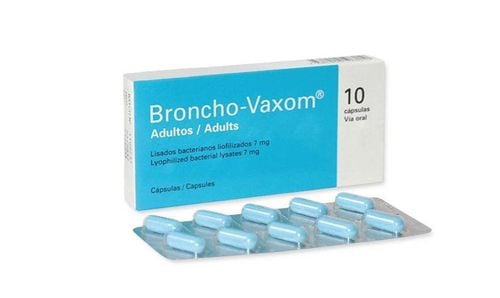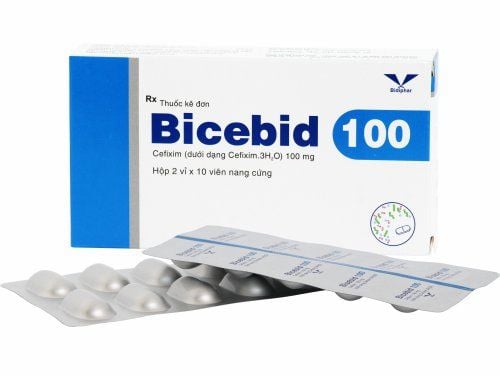This is an automatically translated article.
Bifumax medicine is often indicated in the treatment of diseases related to bacterial infections such as sinusitis, otitis media, tonsillitis or pharyngitis. Before using, you need to learn information about the use, use and dosage of the drug.
1. What is Bifumax?
Bifumax medicine contains the active ingredient cefuroxime. This is a semi-synthetic broad-spectrum antibiotic, belonging to the 2nd generation Cephalosporin group with antibacterial activity. The mechanism of action of this antibiotic is to induce inhibition of bacterial cell wall synthesis by binding to essential target proteins (including penicillin-binding proteins).
Bifumax is active against aerobic and anaerobic gram-positive and gram-negative cocci, including most penicillinase-producing Staphylococcus strains, as well as against Gram-negative enterobacteria.
Bifumax is used in the form of Cefuroxime axetil base, which is a precursor of cefuroxime, so its advantage is that it is easier for the body to absorb.
2. Indications and contraindications
2.1. Indications With the main ingredient is Cefuroxim, Bifumax is prescribed and recommended by doctors for the following cases:
Patients with lower respiratory tract infections, tonsillitis, acute pharyngitis. Patients with otitis media and acute sinusitis caused by bacteria. People with uncomplicated urinary tract infections, skin and soft tissue infections uncomplicated. People with pyelonephritis, cystitis in men, urethritis and gonorrhea, acute gonococcal urethritis, cervicitis are common in women. People with skin diseases such as boils, pustular dermatitis, impetigo,... 2.2. Contraindications Do not use Bifumax for the following patients:
People with hypersensitivity to any ingredient of the drug or allergic to Cephalosporin or Penicillin group of antibiotics. Pregnancy and lactation because Bifumax can affect the fetus through the placenta and is excreted in breast milk.
3 Dosage and how to use
3.1. Bifumax Dosage Reference Bifumax dosage for adults:
Treatment of pharyngitis, tonsillitis, maxillary sinusitis caused by sensitive bacteria: Use at a dose of 250mg/time, 2 times a day, 12 hours apart. Treatment of chronic bronchitis or secondary bacterial acute bronchitis: Use a dose of 250-500mg / time, 2 times a day, each time 12 hours apart. Treatment of uncomplicated skin and soft tissue infections: Use a dose of 250-500mg / time, 2 times a day, 12 hours apart. Treatment of uncomplicated urinary tract infections: Use a dose of 125mg or 250mg, twice a day, 12 hours apart. Treatment of uncomplicated cervical or urethral gonorrhea or uncomplicated rectal gonorrhea: Use with a single dose of 1g. Reference dosage Bifumax for children:
Treatment of pharyngitis, tonsillitis: Use with a dose of 125mg every 12 hours, 2 times a day. Treatment of otitis media, impetigo: Use with a dose of 250mg / time, 2 times each time, 12 hours apart. 3.2. How to use Bifumax should be taken after eating to avoid the side effects of the drug caused on the gastrointestinal tract.
Note, the usual course of treatment needs to last from 5-10 days. After the above time, if the symptoms are not resolved, the patient still needs to take medicine and contact the doctor for further advice. Patients absolutely should not arbitrarily use the drug for a long time because it can increase the susceptibility and emergence of drug-resistant bacteria, increasing the risk of unwanted side effects.
4. Side effects
During the use of Bifumax, patients may experience some side effects such as:
Appearance of skin-related problems such as erythema, skin necrosis due to toxicity, skin rash, urticaria and can cause itchy skin. Patients may experience serum sickness or gastrointestinal problems such as diarrhea, nausea, vomiting, eosinophilia, and elevated liver enzymes. Some rare symptoms that may occur include pseudomembranous enterocolitis, leukopenia and thrombocytopenia. When using Bifumax, if you notice any abnormal symptoms in your body, immediately notify your treating doctor for advice on supportive measures or choosing more suitable alternative drugs.
5. Drug interactions
Bifumax has a risk of interacting with some drugs leading to decreased effect or increased possibility of side effects such as:
Concomitant use with high-dose Probenecid-containing drugs can reduce renal clearance of cefuroxime, from here resulting in higher and more prolonged plasma concentrations of Cefuroxime. Concomitant use with aminoglycoside antibiotics or strong diuretics such as furosemide increases the risk of nephrotoxicity, causing kidney failure in patients with long-term use. Avoid concomitant use with oral contraceptives containing estrogen and progesterone because they will reduce the effect of these drugs. In addition to the above drugs, Bifumax also has the risk of interacting with a number of other drugs. Therefore, you need to provide information to your doctor about your medical history or certain medications you are taking to be prescribed appropriately.
Precautions when using Bifumax:
Patients should pay attention not to abuse antibiotics, only use them when absolutely necessary and follow the instructions and instructions of the doctor. When using Bifumax, it is necessary to pay attention to the dosage, regularly check renal function in patients with impaired renal function. Carefully read the drug label, expiration date, and instructions for use before use to avoid using expired products. Use the correct dose and complete dose when prescribed. If you miss a dose, do not double the dose to make up for the missed dose. Above is all information about Bifumax, you need to read the instructions for use carefully, consult your doctor / pharmacist before use. Note, Bifumax is a prescription drug, you need to use it as prescribed by your doctor, absolutely do not self-treat at home.













